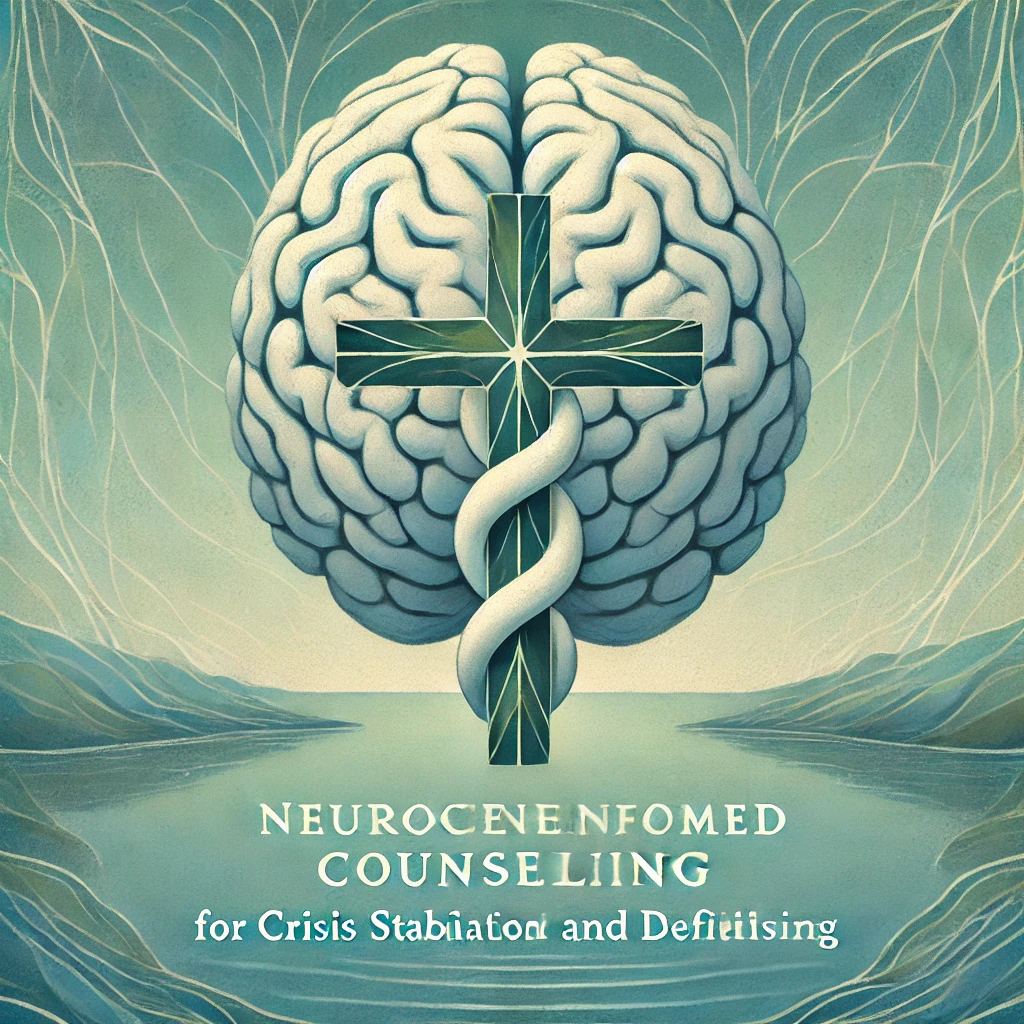NICC Protocol for Crisis Stabilization & Debriefing

Welcome to this episode of the Neuroscience Informed Christian Counseling (NICC) podcast, where we explore the NICC treatment protocol for crisis stabilization and debriefing. This article will provide an in-depth look at the methods and principles guiding this approach, aiming to offer both immediate and long-term support for individuals navigating intense pain and suffering.
*Download the protocol document here: NICC TxP- (I) Crisis Stabilization & Debriefing 7-14-24
Understanding Crisis and Trauma
Pain and suffering are inevitable aspects of life, as Jesus himself noted in John 16:33, “In the world you will have trouble.” Trauma, however, can be mitigated or healed. Trauma occurs when our nervous system is overwhelmed and dysregulated, preventing us from organizing our experiences effectively. The NICC protocol focuses on preventing or reducing traumatic responses through two primary goals: regulating the nervous system and organizing the experience.
Goals of Crisis Stabilization
Regulating the Nervous System
Regulating the nervous system is essential to stabilize someone in crisis. This process involves several steps:
Establishing a Sense of Safety
To bring the prefrontal cortex online, enabling rational thought and organization of experiences, the individual must feel safe. This involves ensuring their physical environment is secure and communicating this safety to them.
Example:
- “Jane, can you look around and tell me if you feel safe in this space? Are there any immediate threats?”
The tone, facial expressions, and body language of the counselor are critical in conveying safety. Speaking in a gentle, low-pitched voice and modeling slow, deep breathing can help shift the individual out of fight-or-flight mode into a calm state.
Troubleshooting Basic Needs
Ensuring that basic needs such as safety, shelter, food, water, clothing, and human support are met is crucial. The counselor should help the individual create a plan to meet these needs, involving another safe person to assist them.
Example:
- “Jane, do you have a safe place to go after our session? Do you have food, water, and someone to support you?”
Establishing a Self-Care Plan
Educating the individual on basic self-care practices is vital for continued regulation. Key elements include:
- Eating balanced meals three times a day.
- Getting 7-10 hours of sleep.
- Engaging in regular exercise to manage stress hormones.
- Taking it easy, avoiding extra challenges, and getting plenty of rest.
- Journaling to process thoughts and emotions.
- Connecting with safe friends and family to avoid isolation.
Organizing the Experience
Once the individual’s nervous system is regulated and their basic needs are secured, the next step is helping them organize their experience.
Narrative Sharing
Invite the individual to share their story. This helps them process and organize their experiences in a coherent way.
Example:
- “Can you share with me what happened?”
Emotional Processing
Facilitate the individual’s emotional response to their experience. Reflect their emotions, validate their feelings, and provide emotional support.
Example:
- “How are you feeling? It makes sense to feel this way given what you’ve experienced.”
Noticing and Naming
Collaboratively observe (Notice) and label (Name) the individual’s experiences and emotions. This helps them become aware of and articulate their experiences.
Example:
- “I’m noticing that you seem sad when you talk about this. Can you describe what you’re feeling?”
Co-Creating a Narrative
Through the process of noticing and naming, a coherent narrative emerges that helps the individual make sense of their experience.
Example:
- “It sounds like this event has deeply affected you. Let’s talk about how it has impacted your life.”
Identifying Losses and Processing Grief
Recognize both tangible and intangible losses and help the individual process their grief.
Example:
- “What have you lost through this experience? It’s important to acknowledge these losses and allow yourself to grieve.”
Transforming Wounded Parts
Address past traumas that may resurface due to the current crisis. This provides an opportunity for deep healing.
Example:
- “I wonder if there might be past experiences that feel connected to what you’re going through now?”
Consolidating Learning into Identity
Integrate the wisdom gained from the experience into the individual’s identity, fostering growth and maturity.
Planning Action
Help the individual develop a plan for moving forward, informed by the insights gained during the healing process.
Example:
- “What steps can you take to move forward? Let’s think about your relationships, work, and living arrangements.”
Conclusion
While pain and suffering are inevitable, trauma can often be prevented or healed through effective intervention. The NICC protocol for crisis stabilization and debriefing provides a structured approach to help individuals navigate their experiences, regulate their nervous systems, and organize their experiences into coherent narratives. Through this process, they can transform their pain into a source of growth and wisdom, enabling them to move forward and thrive.
For more information on the NICC treatment protocols and to access additional resources, please visit our website or contact us directly. Thank you for joining us on this episode of the Neuroscience Informed Christian Counseling podcast.
REFERENCES